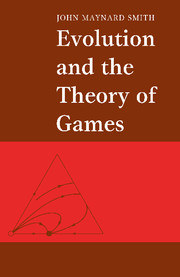Book contents
- Frontmatter
- Contents
- Preface
- 1 Introduction
- 2 The basic model
- 3 The war of attrition
- 4 Games with genetic models
- 5 Learning the ESS
- 6 Mixed strategies – I. A classification of mechanisms
- 7 Mixed strategies – II. Examples
- 8 Asymmetric games – I. Ownership
- 9 Asymmetric games – II. A classification, and some illustrative examples
- 10 Asymmetric games – III. Sex and generation games
- 11 Life history strategies and the size game
- 12 Honesty, bargaining and commitment
- 13 The evolution of cooperation
- 14 Postscript
- Appendixes
- Explanation of main terms
- References
- Subject index
- Author index
10 - Asymmetric games – III. Sex and generation games
Published online by Cambridge University Press: 05 June 2012
- Frontmatter
- Contents
- Preface
- 1 Introduction
- 2 The basic model
- 3 The war of attrition
- 4 Games with genetic models
- 5 Learning the ESS
- 6 Mixed strategies – I. A classification of mechanisms
- 7 Mixed strategies – II. Examples
- 8 Asymmetric games – I. Ownership
- 9 Asymmetric games – II. A classification, and some illustrative examples
- 10 Asymmetric games – III. Sex and generation games
- 11 Life history strategies and the size game
- 12 Honesty, bargaining and commitment
- 13 The evolution of cooperation
- 14 Postscript
- Appendixes
- Explanation of main terms
- References
- Subject index
- Author index
Summary
Some theoretical considerations
We owe primarily to Trivers (1972, 1974) the recognition that conflicts of interest may arise between members of a species which differ in age or sex. The meaning of the word ‘conflict’ in this context can best be illustrated by the example of parent–offspring conflict over weaning time (Trivers, 1974). Suppose that the age at weaning would be XM if it were determined by genes expressed only in the mother, and would be XC if it were determined by genes expressed only in the child, then we can speak of conflict if XM ≠ XC. Conflict can similarly occur between males and females, for example over whether mating shall take place or over the extent of parental care provided by each. In a similar spirit, one can speak of conflict between genes expressed in zygotes and gametes, or between chromosomal and cytoplasmic genes (Cosmides & Tooby, 1981; Eberhard, 1980b).
In this chapter I discuss how game theory models can be applied to such problems. The methods are more useful for analysing conflicts between males and females than between parents and offspring. The latter type of conflict requires an explicit genetic model because, by definition, offspring are related to their parents, and models of games between sexual relatives are not easy to develop. For the same reason, genetic models are needed for conflicts over mating between relatives (Packer, 1977a; Parker, 1979) or over the sex ratio between queens and workers (Trivers & Hare, 1976).
- Type
- Chapter
- Information
- Evolution and the Theory of Games , pp. 123 - 139Publisher: Cambridge University PressPrint publication year: 1982



